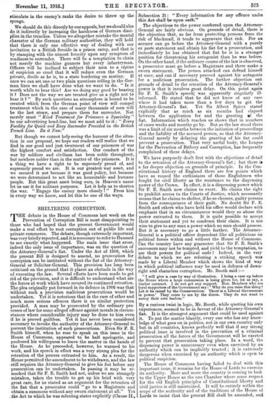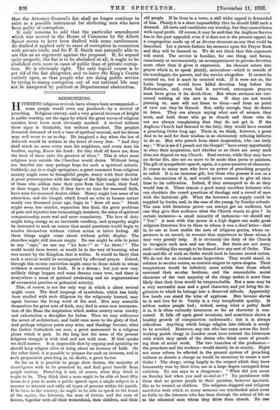SHELTERING CORRUPTION. T HE debate in the House of Commons last
week on the Prevention of Corruption Bill is most disappointing to those who had hoped that the present Government would make a real effort to root corruption out of public life and private commerce. The debate, though extremely important, was very briefly reported, and it is necessary to refer to Hansard to see exactly what happened. The main issue that arose, indeed the only issue of importance, was on the question of the Attorney-General's fiat. Under the Act of 1906, which the present Bill is designed to amend, no prosecution for corruption can be instituted without the fiat of the Attorney- General or Solicitor-GeneraL This provision has long been criticized on the greund that it places an obstacle in the way of executing the law. Several efforts have been made to get .rid of the provision, and it is difficult to understand what are the forces at work which have secured its continued retention. The plea originally put forward in its defence in 1906 was that without such a provision malicious prosecutions would be undertaken. Yet it is notorious that in the case of other and much more serious offences there is no similar protection provided. A man may be prosecuted by the ordinary pro- cesses of law for some alleged offence against morals in circum- stances where considerable injury may be done to him even if he is proved guiltless. Yet it has never been considered necessary to invoke the authority of the Attorney-General to prevent the institution of such prosecutions. Even Sir F. E. Smith himself, when he rose to speak on this issue in the • House of Commons, appeared to be half apologetic, and professed his willingness to leave the matter in the hands of the House. As he proceeded, however, he warmed to his work, and his speech in effect was a very strong plea for the retention of the powers entrusted to him. As a result, the House permitted the amendment to be withdrawn, and the law • still requires the Attorney-General to give his fiat before any . prosecution can be undertaken. In passing it may be re- marked that Sir F. E. Smith had not, unless we are strangely mistaken, taken the trouble to get up his brief with very great care, for he stated as an argument for the retention of the fiat that a prosecutor could "go to a Magistrate and obtain a summons without any sworn statement at all." Yet the Act to which he was referring states explicitly (Clause II., Subsection 3) : "Every information for any offence undee this Act shall te,npon The objections to the power conferred upon the Attorney General are fairly obvious. On grounds of detail, there is the objection that, so far from protecting persons from the risk of blackmail, it tends to aggravate that risk. For an accuser can go before the Attorney-General with a purely en parts statement and obtain his fiat for a prosecution, and immediately he has obtained that fiat he is in a stronger position for -threatening his antagonist than he was before. On the other hand, if the ordinary course of the law is observed, a prosecutor must go_ before a Magistrate and there make a sworn statement. The person attacked can defend himself at once, and can if necessary proceed against his antagonis for a malicious prosecution. The further objection ont grounds of detail to the retention of the Attorney-General's power is that it involves great delay. On this point again Sir F. E. Smith's speech was apparently singularly ill- informed. He stated that he did not know of any case where it had taken more than a few days to get the Attorney-General's fiat. Yet Sir Albert Spicer stated explicitly that as much as six months had elapsed between the application for and the granting of the fiat. Information which reaches us shows that in numbers of cases weeks and months go by. But as the law stood there was a limit of six months between the initiation of proceedings and the liability of the accused person, so that the Attorney- General merely by delaying the granting of his fiat could prevent a prosecution. That very useful body, the League for the Prevention of Bribery and Corruption, has frequently complained of these delays.
We have purposely dealt first with the objections of detail to the retention of the Attorney-General's fiat ; but there is a far deeper objection on grounds of principle. In the Con- stitutional history of England there are few points which have so roused the enthusiasm of those Englishmen who fought for civil liberty as the resistance to the dispensing power of the Crown. In effect, it is a dispensing power which Sir F. E. Smith now claims to exert. He claims the right to prohibit access to the Courts of Justice, which necessarily means that he claims to shelter, if he so chooses, guilty persona from the consequences of their guilt. No doubt Sir F. E. Smith and others who have held his office would declare with emphasis that in no circumstances would they so abuse the power entrusted to them. It is quite possible to accept their statement and yet to condemn their claim. It is not wise to give to any man a power which no man should possess. But it is necessary to go a little further. The Attorney- General is a political officer dependent like all politicians on political forces within and without the House of Commons. Can the country have any guarantee that Sir F. E. Smith's successors may not be tempted, and yield to the temptation, to use their powers for political ends ? Indeed, in the very debate to which we are referring a striking speech was made by a Liberal Member which shows the kind of way in which political influence may be used in defence of down- right and shameless corruption. Mr. Booth said :— " I will give a case by way of illustration. I bring a case up before the House where a large commission is being given for, lot us say, a timber contract. I do not get any support. Hon. Members who are loyal supporters of the Government say Why do you raise this thing ! Let it be raised by the Conservatives. There is a Liberal Government in power.' They come to me by the dozen. They do not want to annoy their own leadozs."
By a curious twist in logic, Mr. Booth, while quoting his own experiences, seemed to be in favour of the Attorney-General's fiat. It is the strongest argument that could be used against it. To put the matter bluntly, every one who has any know- ledge of what goes on in polities, not in our own country only but in all countries, knows perfectly well that if any strong political issue is involved in the prevention of a criminal prosecution all the forces of the Government will be exerted to prevent that prosecution taking place. In a word, the dispensing power is unnecessary even when exercised by an authority which can be implicitly trusted ; it is extremely dangerous when exercised by an authority which is open to political suspicion. The House of Commons having failed to deal with this important issue, it remains for the House of Lords to exercise its authority. More and more the country is coming to look to the Upper House as the one Chamber where some respect for the old English principles of Constitutional liberty and civil justice is still maintained. It will be entirely within the scope of the authority and of the traditions of the House of Lords to insist that the present Bill shall be amended, and that the Attorney-General's fiat shall no longer continue to exist as a possible instrument for sheltering men who have been guilty of corruption.
It only remains to add that the particular amendment which was moved in the House of Commons by Sir Albert Spicer seems to have been drafted with some carelessness. As drafted it applied only to cases of corruption in connexion with private trade, and Sir F. E. Smith was naturally able to use this as an argument against the proposal. If, he argued quite properly, the fiat is to be abolished at all, it ought to be abolished even more in cases of public than of private corrup- tion. He is obviously right. The only logical course is to get rid of the fiat altogether, and to leave the King's Courts entirely open, so that people who are doing public service by trying to stamp corruption out of our national life may not be hampered by political or Departmental obstruction.



































 Previous page
Previous page